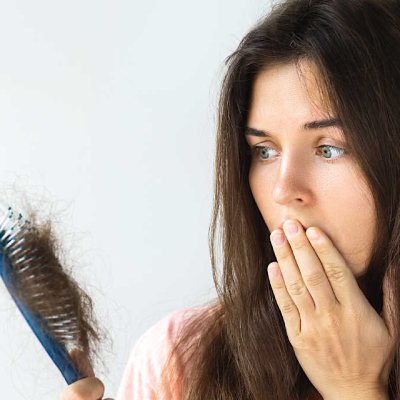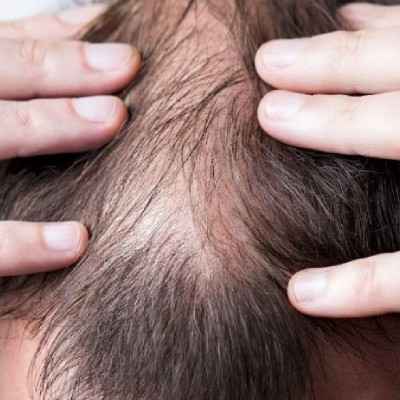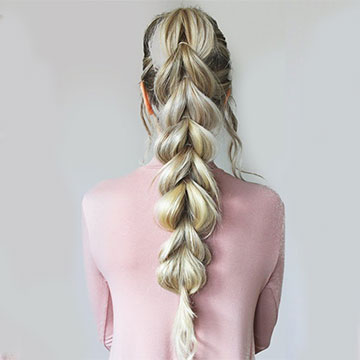Causes of Hair Loss in Women According to Their Age

05 July 2024

moneshairexperts

Both men and women experience hair loss, although the causes might differ based on several variables, including age. Women with hair loss may find it particularly upsetting, lowering their confidence and sense of self. Women at any age can have hair loss, which has a variety of underlying causes, including genetics, hormonal changes, illnesses, and lifestyle. In such scenarios, the ideal choice is to consult an expert who can analyze the situation and suggest a suitable solution. We at Advanced Hair Studio are committed to assisting women of all ages in locating practical hair loss treatments for women since we recognize that hair loss may be a complicated problem. This blog will examine the typical reasons for hair loss in women by age and strategies for promoting hair growth.
Causes of Hair Loss in Young Women
Women of all ages, particularly young ladies, are affected by hair loss, a distressing condition. Although the causes of hair loss in young women might be complicated, several common variables play a role.- One of the main contributors to hair loss in young women is genetics. If hair loss runs in the family, you may be more likely to lose it early in life.
- Another typical reason for hair loss in young women is hormonal imbalances, such as PCOS or thyroid conditions.
- Young women's hair loss can also be influenced by stress and poor nutrition.
- Hair loss is brought on by tension on the hair, which is created by excessive heat styling, chemical treatments, and tight hairstyles.
- Medical disorders or prescription drugs can also make young women lose their hair in some situations.
Causes of Hair Loss in Middle-Aged Women
Women may have hair loss as they age for a variety of reasons.- Hormonal changes, particularly during perimenopause and menopause, are a major hair fall reason in females in their middle years. Women undergo these phases of declining estrogen levels, which may impact hair growth.
- In middle-aged women, hair loss can also be caused by stress and poor nutrition. Hair follicles can enter a resting phase due to ongoing stress, and inadequate nutrition can deprive hair follicles of vital vitamins and minerals required for hair growth.
- Medical issues such as autoimmune diseases and thyroid disorders can also cause hair loss in middle-aged women.
- Several medications, including blood thinners, antidepressants, and chemotherapy therapies, might result in hair loss as a side effect.
- In middle-aged women, excessive heat styling and chemical treatments can also cause hair loss since they weaken the hair follicles and cause breakage.
Hair Loss in the 60s
women in their 60s, hair loss is a frequent problem that various circumstances can bring.
- Hormonal changes during menopause are one of the main reasons older women experience hair loss. Women's bodies produce less estrogen and progesterone as they age, which can result in hair loss and thinning.
- In addition, autoimmune diseases and thyroid problems might be medical ailments that cause hair loss in older women.
- Hair loss is a side effect of some treatments, including blood thinners and chemotherapy therapies.
- Poor nutrition and ongoing stress can cause hair loss in older women.
- Hair loss in older women may occasionally run in families. Women with heredity hair loss may be more prone to develop it as they age.
What Causes Hair Loss in Women as they Age?
Hair loss is a typical occurrence affecting people of all ages and genders. Yet, as women age, hair loss becomes more prevalent in them. Women's hair loss can be ascribed to several causes, such as heredity, hormonal changes, and lifestyle choices.- Genetics is one of the primary reasons for female pattern baldness. If there is a history of hair loss in the family, women are more likely to suffer from thinning and baldness as they age. An extremely common kind of genetically linked hair loss in women is pattern baldness in women, also known as androgenetic alopecia.
- Women who lose hair may also be affected by hormonal changes like going through menopause and have lower estrogen levels. In addition, illnesses, including thyroid problems and polycystic ovarian syndrome (PCOS), can also result in hormonal imbalances and hair loss.
- Excessive hairstyling, poor diet, stress, and chemical treatments can all harm hair and make it fall out. Tight hairstyles like braids and ponytails might result in hair loss since they put constant pressure and tension on the hair follicles.
- Moreover, drugs, including blood thinners, antidepressants, and chemotherapy treatments, can cause hair loss in women. Medical conditions such as alopecia areata, bacterial infections of the scalp, and autoimmune diseases can also result in hair loss.
What works for Hair Regrowth in Women?
Hair regrowth for women can be difficult, but several efficient hair treatments can encourage hair growth and boost confidence. The following are some of the most well-liked hair-growth treatments for women:- Hair Transplant Surgery In a hair transplant, healthy hair follicles are removed from the side or back of the scalp and placed in the bald or thinning portions of the scalp. Results from this operation seem natural and could last a lifetime. Women with considerable hair loss or thinning have a great alternative in hair transplant surgery.
- Laser Treatment at Low Levels (LLLT) Low-level laser therapy (LLLT) is a non-invasive procedure that promotes hair growth. It aids in boosting cellular activity in the hair follicles, decreasing inflammation, and increasing blood flow to the scalp. LLLT is a painless, safe procedure that can be applied independently or with other methods for promoting hair growth.
- Hair Extensions Women with bald spots or thinning hair might temporarily fix the problem with hair extensions. Hair extensions can lengthen, thicken, and add volume, giving the illusion of fuller hair. Human hair, synthetic hair, and clip-in hair extensions are just a few styles and materials available for hair extensions.
- Medications The FDA has approved medications for female pattern baldness hair loss, including minoxidil. A topical drug called minoxidil is applied directly to the scalp, which helps increase blood flow to the hair follicles and encourages hair growth.
- Lifestyle Changes Lifestyle modifications that improve the general health of the hair and encourage hair growth include eating a balanced diet, lowering stress levels, and avoiding harsh chemical treatments. In conclusion, ladies can get a variety of hair treatments, such as hair transplant surgery, LLLT, hair extensions, drugs, and lifestyle modifications. The root of hair loss, the degree of baldness or hair thinning, and personal preferences influence the optimal hair restoration treatment for women. Speaking with a hair doctor is imperative to find a suitable treatment strategy for the patient's needs.
Conclusion
Women of all ages are susceptible to the frequent problem of hair loss. There are multiple causes of hair loss in women, which frequently change with age. Visiting an expert as soon as possible is crucial if you detect hair shedding, thinning, or bald areas. They can suggest treatments and assist you in determining what is causing the hair loss. Together with prescription drugs and surgical procedures, a healthy diet, stress management, and reducing the number of chemical hair treatments and products you use are other strategies that you can use to address hair loss. Consult a hair restoration specialist at the Advanced Hair Studio hair clinic if you're losing your hair to find the right treatment.Stay Updated
Subscribe to our email newsletter for helpful tips and valuable resourses
Be an influencer
Join forces with Advanced Hair Studio! Explore exciting collaboration opportunities tailored for influencers. Let's redefine haircare together.
Connect now












